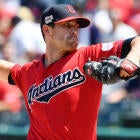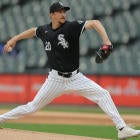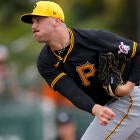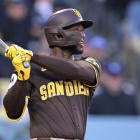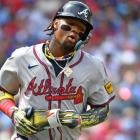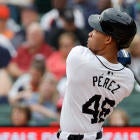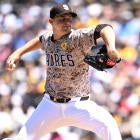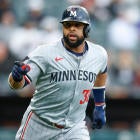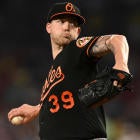A year ago, I talked a pretty big game after the Tout Wars draft. I had finished second and third my first two years in this most highly regarded of industry leagues, despite only mild enthusiasm for the teams I actually drafted. So to come out of a draft feeling that good, first place seemed like the obvious destination.
Clearly, I miscalculated. I ended up tying for sixth. The embarrassment was magnified by my confidence going in and forced me to examine whether my approach, which I thought I had executed brilliantly, was actually to blame.
And that's where it all started for me: the realization that high-end starting pitchers are the most valuable currency in an era when home runs are so easy to come by and that no matter how many you think you have, it probably isn't enough.
I was halfway there last year. I noticed that a gap was forming between the starting pitchers who made a real difference and the ones who didn't — and that there were enough of the former that you couldn't afford to be the one who gets left out. It was already a radical departure from longstanding Fantasy Baseball axioms — the kind I voiced proudly and emphatically for most of my 12 years at CBS — which basically reduced pitching vs. hitting to a matter of volatility. Pitching was (and remains) more volatile than hitting, so if you load up on hitting early, you're not only getting a more reliable return but also taking advantage of pitching's volatility by positioning yourself to scoop up all the breakthroughs no one sees coming.
But those breakthroughs aren't coming anymore — not with near the same frequency, anyway. Too many of the pitchers with the talent for it are limited by workload, and the talent disparity itself is so great, with some of the best bat-missing behemoths the game has ever known also being the ones most trusted for a massive workload. Add in a second home run spike last year, and the pitchers who already didn't measure up just got bludgeoned. Any Fantasy player who tried to piece together a pitching staff with that mess had no hope of competing.
So yes, I had the right approach, but where I erred was in not taking it far enough. It goes back to the volatility issue. Blake Snell and Zack Greinke didn't cut it in part because Snell got hurt. Did I miss the offense I could have gotten with the second-round pick I used on him? Not really. I placed fine in all the offensive categories, able to solve most of my problems via the waiver wire, if not always immediately, even in a 15-team league. But I got crushed in the pitching categories, and I found that to be true in all of the leagues where I fell short even though I made a concerted effort to invest more in pitching.
I needed a safeguard against the volatility, and the only true safeguard in an era when so few breakouts are emerging is excess. With that in mind, here's the team I put together for 2020.
Remember, there are 15 teams in all. And while this Tout Wars league uses Rotisserie scoring, it replaces batting average with on-base percentage.
You can find the full draft results here.
Startling lineup (round number in parentheses):
C - Mitch Garver, MIN (10)
C - Pedro Severino, BAL (29)
1B - Josh Bell, PIT (7)
2B - Ketel Marte, ARI (3)
3B - Gio Urshela, NYY (14)
SS - Corey Seager, LAD (9)
CI - Evan White, SEA (23)
MI - Jose Altuve, HOU (4)
OF - Charlie Blackmon, COL (5)
OF - Kyle Tucker, HOU (12)
OF - Mark Canha, OAK (13)
OF - Mallex Smith, SEA (15)
OF - Jo Adell, LAA (16)
U - Nick Solak, TEX (17)
P - Gerrit Cole, NYY (1)
P - Shane Bieber, CLE (2)
P - Sonny Gray, CIN (6)
P - Lance Lynn, TEX (8)
P - Matthew Boyd, DET (11)
P - Brandon Kintzler, MIA (19)
P - Alex Wood, LAD (20)
P - Wade Davis, COL (22)
P - Hunter Harvey, BAL (24)
Bench:
OF - Sam Hilliard, COL (18)
SS - Carter Kieboom, WAS (21)
OF - Tyler O'Neill, STL (25)
P - Cole Hamels, ATL (26)
1B - Ryan Mountcastle, BAL (27)
1B - Mike Ford, NYY (28)
Oh yes, he did! If drafting a starting pitcher in the second round last year wasn't taking it far enough, how about the first and second round?
OK, let's not misrepresent the ambition here. It wasn't exactly what I set out to do, and as best I can recall, it's the first time I've ever begun a Fantasy Baseball draft with two starting pitchers. My hope in picking seventh was that after the usual five went off the board (Ronald Acuna, Mike Trout, Christian Yelich, Cody Bellinger and Mookie Betts, in some order), the person picking sixth would make the decision of Cole vs. Trea Turner for me. I assumed, then, I'd wind up with Turner and have a nice stolen base foundation to begin the draft. But then when Juan Soto went fourth overall, pushing everyone else down a spot, it made it so I couldn't afford to pass up Cole.
I would have liked to secure steals in the second round still, but the obvious contributors in that range, Jose Ramirez and Fernando Tatis, both went before my pick. You could make a case for Starling Marte, perhaps, and he did go four picks after mine. But his low walk rate hinders him in an OBP league, and it's not like his expected steals output would fully address the need. No, if I knew it was a pure bat I was taking, as opposed to a speed source, I could have faith one would still be there in Round 3. I couldn't say the same for the high-end starting pitchers, though, particularly with Chris Sale (elbow) being removed from the equation and particularly since I wasn't going to settle for just two this time.
It worked out. In fact, it worked out three times over. Ketel Marte, Jose Altuve and Charlie Blackmon are exactly the type of hitters who can contribute first round-caliber numbers — they all did last year, Altuve's being more on a per-game basis — but get pushed down just because someone has to in a loaded hitting environment. Are they definitively worse than J.D. Martinez, who went 20th overall? I don't see how anyone could make that claim.
Getting three of that sort of hitter after passing up on all those big bats in Rounds 1 and 2 felt like too much of a gift for me to divert my attention to stolen bases. I mean, Cavan Biggio went two picks before Altuve. Ramon Laureano and Luis Robert went in the same round as Blackmon. People were reaching for steals in this draft, beyond even the usual for a Rotisserie league, and by refusing to get caught up in it myself, I was able to make up for the hitters I missed in the first two rounds while still getting the pitching excess I wanted.
Four of my top 37 starting pitchers — that's what I'm aiming for in every draft, those 37 being the pitchers who I consider more likely than not to make an honest difference. Some of them won't, but you won't know which ones, which is why you draft four in the hopes two or three deliver. Matthew Boyd is kind of a bonus fifth one, too. He's not technically among the top 37, but he measures up in terms of strikeout ability (238 last year) and workload expectations (185 1/3 innings). He has massive home run issues to address, and it's possible I'll need to get his ERA out of my lineup at some point. But in a disaster scenario where three of my top four starting pitchers go down, at least I know Boyd can keep me afloat in strikeouts.
What if everything goes right and I'm blowing out all the other teams in the pitching categories? Like I said, high-end starting pitchers are the most valuable currency in the game right now. I'm sure I'll have no trouble working out a trade. It's all anybody wanted in a trade scenario last year.
Broadly speaking, what I ended up doing in this draft is leveraging the stolen base and save scarcities to give me the pitching surplus I wanted while still keeping pace with the bats. Stolen bases and saves are scarce, yes — a select few players are capable of contributing to them, which means they come at a premium — but they're also highly volatile. A hefty investment doesn't guarantee a big total in either, and since it's not like those categories work in conjunction with any of the others (meaning a high saves total doesn't contribute to a lower ERA nor a high steals total to a higher batting average), the steals and saves themselves are entirely what you're paying for. They're a luxury, and they're not the luxury I wanted. No, I wanted all the starting pitchers.
Still, punting categories should never be the goal, and I feel like I gave myself a fighting chance in both. I've never been a fan of true steals specialist who provide that and nothing more, but I can hide a Mallex Smith easier in a 15-team league, where nobody's lineup is completely star-studded. Moreover, getting last year's stolen bases leader with the 217th overall pick was exactly the sort of good fortune I needed after neglecting the category for so long. There's a chance players like Kyle Tucker, Nick Solak and Sam Hilliard could make a worthwhile contribution in steals as well, but it'll be mostly Smith who carries me.
As for saves, Brandon Kintzler and Wade Davis are technically the front-runners in their respective bullpens. They're probably not good enough to keep the job, but they may be. Both have a history in the role. Really, I just need them to keep me afloat until some alternatives begin emerging on the waiver wire, as alternatives always do, and considering I got the first of them, Kintzler, a full five rounds after the last batch of unreliable closers (guys like Mark Melancon and Joe Jimenez) went off the board, anything the two of them give me is like free money. Hunter Harvey, meanwhile, is sort of my speculative pick for the Orioles bullpen. They don't seem to want Mychal Givens closing for them, really.
Apart from those bargain bin closers, I devoted the late rounds to grabbing whatever upside bats I could find — ones that I thought had some kind of path to playing time even if it's not fully realized yet. Chances are one or two of Jo Adell, Sam Hilliard, Carter Kieboom, Evan White, Tyler O'Neill, Ryan Mountcastle and Mike Ford will hit big for me, and then I'll have an actual difference-maker as opposed to a marginal Stephen Piscotty or Jason Heyward type. That's kind of a Fantasy 101 tip, but not everyone follows through on it. I've scored big with it on past Tout Wars teams, including Pete Alonso and Jeff McNeil last year and Aaron Judge in 2017.
So which sleepers should you snatch in your draft? And which undervalued first baseman can help you win a championship? Visit SportsLine now to get rankings for every single position, all from the model that called Kenta Maeda's huge breakout last season, and find out.













